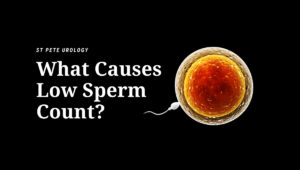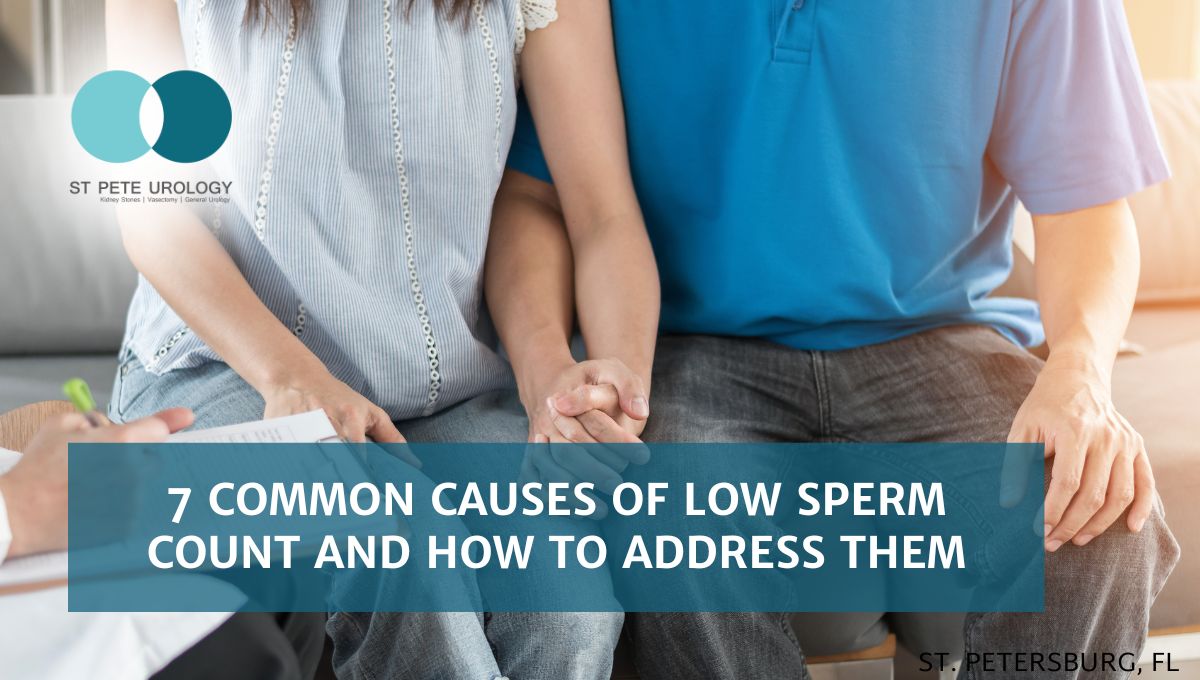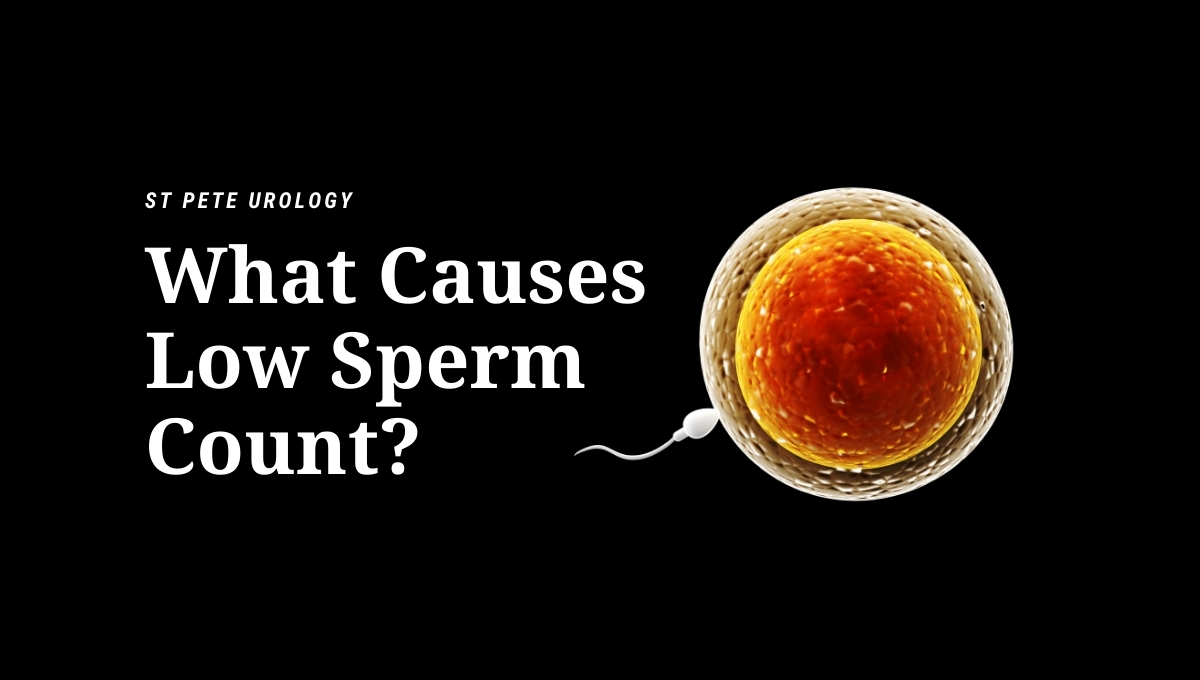Discover how male infertility diagnosis works, from semen analysis to advanced testing. Learn about treatment options available at St. Pete Urology in Florida.
Continue reading7 Common Causes of Low Sperm Count and How to Address Them
Discover the 7 most common low sperm count causes affecting male fertility. Learn about varicoceles, hormonal issues, and treatment options at St. Pete Urology.
Continue readingWhat Are the Primary Factors Leading to Male Infertility?
Understanding the primary factors leading to male infertility is critical to helping you tackle the condition head-on.
Continue readingWhat could a male do to help correct a low sperm count
What Causes Low Sperm Count?
 Low sperm count, which means having fewer than normal sperm in the ejaculate, decreases the likelihood that your sperm will fertilize your partner’s ovum and result in pregnancy. But it may also be related to your overall health, as it is often characterized by symptoms such as pain, swelling or a lump in the testicle area, low sex drive, erectile dysfunction, or decreased facial or body hair. Your sperm count is lower than normal if you have fewer than 15 million sperm per milliliter of semen.
Low sperm count, which means having fewer than normal sperm in the ejaculate, decreases the likelihood that your sperm will fertilize your partner’s ovum and result in pregnancy. But it may also be related to your overall health, as it is often characterized by symptoms such as pain, swelling or a lump in the testicle area, low sex drive, erectile dysfunction, or decreased facial or body hair. Your sperm count is lower than normal if you have fewer than 15 million sperm per milliliter of semen.
What are the causes of low sperm count?
1. Emotional stress and inadequate sleep
Prolonged or severe emotional stress may interfere with the hormones needed to produce sperm, while depression lowers sperm concentration. Inadequate sleep makes it difficult to maintain a healthy weight and may lead to obesity. Obesity impairs fertility by directly impacting sperm and causing changes in the hormones that promote sperm production.
2. Overexposure to harmful chemicals
Chronic exposure to pesticides and other harmful chemicals can lead to low sperm count. For instance, prolonged exposure to industrial chemicals, such as xylene, toluene, benzene, herbicides, pesticides, organic solvents, BPA, perfluorinated chemicals, lead, and painting materials may lead to low sperm count. Likewise, when exposure to radiation or x-rays lowers sperm production, it can take years for sperm production to normalize.
3. Lack of exercise
Exercise plays a huge role in the health of your sperm. Men who sit for longer periods tend to have a lower sperm count than those who are active in their daily life. This means you can improve your numbers through moderate routine exercise every day, such as a daily walk for lunch or daily yoga in the evenings. Frequent exercise will increase your circulation, boost your mood, and increase your sperm count.
4. Overheating of the testicles
Exposure to high temperatures impairs sperm production and function. This is why frequent use of hot tubs or saunas temporarily lowers sperm count. Similarly, wearing tight clothing, sitting for long periods or working on a laptop for a long period of time may raise the temperature around the scrotum and reduce sperm production.
5. Drug and alcohol use
Anabolic steroids that are taken to stimulate muscle growth and can cause testicular shrinkage and decreased sperm production. Use of cocaine or marijuana also lowers sperm number and quality, while excessive drinking of alcohol lowers testosterone levels and hampers sperm production. Men who smoke tend to have a lower sperm count than those who do not.
6. Infection, medications and prior surgery
Some infections interfere with sperm production and sperm health. They include epididymitis (inflammation of epididymis), orchitis (inflammation of testicles), sexually transmitted infections (like gonorrhea, Chlamydia and HIV), and mumps infection. Also, long-term anabolic steroid use, cancer medications, testosterone replacement therapy, some ulcer medications, some antifungal and antibiotic medications, and other medications can hinder sperm production and lower sperm count.
Prior surgeries such as a vasectomy, scrotal or testicular surgery, inguinal hernia repair, prostate surgery, and large abdominal surgery for testicular or rectal cancer may affect sperm production. Similarly, tubes that carry sperm may be blocked by injury from surgery, trauma, prior infections, or abnormal development such as cystic fibrosis. Spinal cord injuries, diabetes and surgeries can block the normal flow of sperm and lead to retrograde (backward) ejaculation.
7. Certain medical conditions
A varicocele, the swelling of veins that drain the testicle, impairs testicular temperature regulation and causes low sperm count. Anti-sperm antibodies, which are immune cells that mistakenly identify sperm as harmful invaders, may destroy sperm and lead to low sperm count.
Undescended testicles, Peyronie’s disease, sperm duct problems, vas deferens blockages, unhealthy prostate, high blood pressure, diabetes, peripheral vascular disease, tumors that affect male reproductive organs directly, and hormonal imbalances may impair sperm production and lower sperm count.
What should you do to improve your sperm count?
- Eat healthy
- Exercise regularly and minimize your sitting time
- Don’t smoke
- Reduce or abstain from alcohol
- Avoid illicit drugs
- Use protection (condoms) during sexual intercourse
- Manage stress
- Get enough sleep
- Maintain a healthy weight
- Avoid exposure to pesticides, heavy metals, and other toxins
- Keep your laptop away from your lap
- Speak with your doctor about medications that can affect your sperm count
- Avoid frequent hot showers or hot tubs.
- Avoid tight pants
Maintaining a high sperm count is not necessarily difficult. All you need is some good habits such as healthy eating, regular exercise, comfortable clothes, and avoiding toxins. You should also speak with your urologist about possible remedies.
At St Pete Urology, we offer a variety of treatments for low sperm count, including lifestyle changes and minimally invasive procedures. We make sure to conduct thorough physical exams, medical history, and diagnostic tests to establish the underlying cause of the low sperm count before we recommend treatment. Meet with one of our urologists and start your journey to healthy fertility. For more information on male fertility, erectile dysfunction and other urologic issues, visit the St Pete Urology website.
5 Things You Need to Know About Men’s Sexual Health
 Sex is a critical part of life. It helps in the perpetuation of species and provides an amazing source of pleasure. It ensures intimacy between partners while making bonds stronger and unions enduring. It is also a wonderful form of exercise that releases stress, gets rid of anxiety, boosts prostate health and improves overall health.
Sex is a critical part of life. It helps in the perpetuation of species and provides an amazing source of pleasure. It ensures intimacy between partners while making bonds stronger and unions enduring. It is also a wonderful form of exercise that releases stress, gets rid of anxiety, boosts prostate health and improves overall health.
What is sexual health?
It is the state of wellbeing that enables a man to engage in and derive pleasure from sexual activity. You are sexually healthy if you have sexual desire (libido), can get and sustain an erection, and can participate in satisfactory sexual intercourse. Sex is a hormone-driven activity that begins at puberty and lasts your entire life.
On average, couples have sex once a week. Each sexual encounter typically lasts 15-30 minutes, though the actual penetration time averages 2 minutes. If you are in a relationship, you may be having less sex than you want due to a lack of intimacy or time. But by working on communication and spending quality time together, you and your partner can improve your intimacy and have a more gratifying sex life.
What should you know about men’s sexual health?
Sexual health in men is affected by a number of physical, psychological, social and interpersonal factors. For example, physiological changes can impact both the desire and the ability to have sex, while emotional and mental factors can determine the satisfaction achieved during sexual intercourse.
As a man, the knowledge of the following male sexual health issues can enable you to achieve better sexual and overall health.
Aging and sexual health
With increasing age, changes are bound to occur in your sexual function, most of which are normal. But even in your 80’s, you should still be able to enjoy sex and intimacy in your relationship. Nevertheless, one frequent effect of aging on sexual health is loss of libido (sex drive)—often due to decreasing testosterone levels. Loss of libido means you have reduced interest in sexual activity or diminished sexual thoughts. You can also lose your libido because of stress, anxiety, relationship issues, side effects of medication or some medical conditions.
If you are experiencing a reduced drive for sex, look out for the symptoms so you can describe them correctly when you speak with your urologist. One way to deal with reduced sexual urge is to take more time in direct stimulation or foreplay. For changes that occur drastically or refuse to go away after sex therapy, work with your urologist to differentiate normal from abnormal changes and receive proper treatment.
As a rule, do not assume that every change that occurs in your sexual function is because you are growing older. After age 40, make sure you are aware of the following health indicators:
- Cholesterol levels
- Blood pressure
- Blood sugar levels
- Testosterone levels
- PSA (Prostate-specific antigen) levels
Erectile dysfunction (Impotence)
Erectile dysfunction (ED) means you are not able to get and maintain an erection that is firm enough for satisfactory sexual intercourse. It is a common sexual health issue affecting up to 50% of men above the age of 40. You may experience erectile dysfunction because of blood flow problems such as vascular disease or blood pressure, which are quite common among aging men. But other factors such as certain medications, use of alcohol and drugs, smoking and surgeries involving prostate cancer may also cause impotence.
Fortunately, medications treat 50-70% of ED cases effectively. However, if your condition does not improve with medication, your urologist can apply various non-surgical techniques to promote blood flow. There are also surgical options such as penile prostheses or implants. Surgery is not advisable as initial treatment; but when done as a last resort it usually delivers satisfactory results.
In some cases, erectile dysfunction is not due to a detectable physiological problem. Your urologist will evaluate your condition in terms of emotional or mental well-being and may recommend you work with a sex therapist. Stress, anxiety, depression or other emotional or psychological problems can often be alleviated by therapist who encourages a comfortable, honest and confidential discussion of the problem.
Peyronie’s disease
Peyronie’s disease develops when scar tissue or plaque occurs inside the erectile tissue of the penis. Though the actual cause of scar tissue formation is unknown, many men have suffered the condition following a minor trauma that elicited bleeding inside the penis. The resulting plaque is usually benign and noncancerous, but it tends to cause the bending of the penis downward or upward depending on its location.
Men with Peyronie’s disease usually experience pain during an erection and find it difficult to have sex. If you have this problem, you need to see a urologist for a timely diagnosis and treatment. The condition is diagnosed using an ultrasound exam which gives a clear picture of the erectile anatomy and function. Most cases of the disease are mild and the initial pain disappears within 6-12 months, allowing patients to return to normal sexual activity. Urologists treat remaining plaques using personalized treatment plans.
Ejaculation disorders
Ejaculation issues in men include premature ejaculation, inhibited (delayed) ejaculation and retrograde ejaculation. When you have premature ejaculation it means you are not able to delay ejaculation until the point when it is mutually desirable for you and your sex partner. It is the most frequent ejaculation issue, particularly among younger men.
Inhibited ejaculation means your ejaculation occurs slowly or never happens at all. Both premature and inhibited ejaculations have psychological causes, such as anxiety about sex, performance or trauma. But there are techniques that can be used to overcome these issues and a qualified therapist can help you. Speak with your urologist for treatment and referral to a sex therapist when necessary.
Retrograde ejaculation means the ejaculate is forced back into your bladder instead of through the urethra and out of the end of the penis at orgasm. It can be due to nerve damage, side effects of medication or surgery for bladder or prostate.
When you experience retrograde ejaculation, your urologist will change your existing medications or prescribe new ones to treat the issue. However, if the problem is caused by surgery, it might not be correctable. But that should not worry you as treatment is not usually medically necessary with retrograde ejaculation unless pregnancy is your goal.
Vasectomy is permanent contraception
Vasectomy is a simple, effective and minimally invasive surgical procedure offered as a permanent method of birth control. The 30-minute procedure involves cutting tubes that transport sperm within the male reproductive system.
The procedure does not affect the sexual health of a man and is very effective in preventing pregnancy. While vasectomy can be undone, the reversal is quite complex and comes with a lower chance of success. The time to undergo a vasectomy is when you are sure you no longer need to make your partner pregnant, for whatever reason, and consider it as a permanent method of birth control.
At St Pete Urology, we offer timely help to men with sexual health issues. We believe that speaking about these issues with a skilled and experienced urologist will help you resolve them. We also remind our clients that any sexual health issue that lasts several months may be an indicator of a more serious underlying medical issue that needs to be treated.
For instance, premature ejaculation may be due to nerve damage, medication or underlying urinary conditions. Problems with libido or erection may be the first indicator of diabetes or hormonal imbalance; while problems with erection may be due to underlying prostate cancer or cardiovascular issues. Hence, seeing a urologist for your sexual health may help uncover a potentially life-threatening condition.
Of course, there is also a connection between your overall health and your sexual health. In fact, hormonal, cardiovascular, neurological and psychological systems all contribute to your sexual performance. A healthy lifestyle that includes a good diet, healthy weight and regular exercise will promote your overall health while enhancing your sexual health and performance. For more information on men’s sexual health issues, visit the St Pete Urology website.
Infertility Treatment Options for Men & Women
 For couples struggling to conceive a child, life might feel like a carousel, trying for the brass ring, month after month. It can put a lot of pressure on the relationship. But now there are fertility treatments that can put the chances of conception in your favor.
For couples struggling to conceive a child, life might feel like a carousel, trying for the brass ring, month after month. It can put a lot of pressure on the relationship. But now there are fertility treatments that can put the chances of conception in your favor.
What are the different types of fertility treatments?
Today we have more technology for diagnosing and treating infertility than ever before. Fertility assessments should be done on both partners to determine which treatments can help, and whether it is a male or female infertility issue.
Female Options for Fertility Treatment
Fertility treatments can include medications to regulate hormones and ovulation, which are often combined with minor surgery approaches. Assisted Reproductive Technology, or ART for short, encompasses several procedures to help you conceive. Some ART procedures make it easier for the sperm to fertilize an egg, and others help with getting the egg to implant in the lining of your uterus.
Common ART fertility treatments are:
Intrauterine Insemination (IUI), in which healthy sperm is collected and then inserted directly into the uterus when you are ovulating.
In Vitro Fertilization (IVF), in which eggs are taken from the ovaries to be fertilized by sperm in the lab where they can develop into embryos. Then a doctor implants the embryos into your uterus after they grows for 3 to 5 days.
GIFT, short for Gamete IntraFallopian Transfer, and ZIFT, Zygote IntraFallopian Transfer. In GIFT, the egg and sperm are collected and immediately placed in a fallopian tube. With ZIFT, the egg(s) and sperm are combined in a lab, resulting in a fertilized egg, which then is placed into the tube at 24 hours.
Cryopreservation, which is known as “freezing” your eggs, sperm or embryos, along with donated eggs or embryos, as well as surrogate mothers who carry the embryo to term.
Both fertility drugs and hormones can be used to help determine when the woman is ovulating or ensure proper levels of hormones. Surgery can remove tissue, such as in cases of endometriosis, or be used to open blocked fallopian tubes.
Enlisting donor sperm, eggs or surrogate mothers, is popular with single people and same-sex couples who desire a baby. Donor sperm or eggs can be the solution if either partner has fertility issues.
Male Options for Fertility Treatment
There are various treatment options if the male needs help with sperm counts, quality or motility. Surgery by a qualified urologist is recommended if the cause is a varicocele (widened veins in the scrotum) or for any blockage in the vas deferens, the tubes that carry the sperm. Antibiotics can be used to treat infections in the reproductive organs, and medications can treat problems with ejaculation or erections. Another option is hormone treatment.
If you wish to conceive but are having problems, our team of specialists at St Pete Urology is experienced in working with couples to make assessments and help in achieving your dreams. For more information, visit the St Pete Urology website.
Can Male Infertility Be Treated?
 For many couples, trying and not being able to conceive a child is a stressful, emotional and frustrating time. Up to 15% of couples are infertile, meaning that they cannot conceive a child despite actively trying for a year or more. And for that 15%, over a third of these problems stem from issues caused by male infertility.Male infertility is the inability to conceive a child. There are no obvious signs that a man is infertile, and he may not realize it until he and his partner are unsuccessful in their attempts. However, in some cases like hormonal imbalances, inherited disorders and testicular vein issues, symptoms may exist. These can include erectile dysfunction, difficulty ejaculating, ejaculating in small volumes, decreased sexual desire, or abnormal breast growth.
For many couples, trying and not being able to conceive a child is a stressful, emotional and frustrating time. Up to 15% of couples are infertile, meaning that they cannot conceive a child despite actively trying for a year or more. And for that 15%, over a third of these problems stem from issues caused by male infertility.Male infertility is the inability to conceive a child. There are no obvious signs that a man is infertile, and he may not realize it until he and his partner are unsuccessful in their attempts. However, in some cases like hormonal imbalances, inherited disorders and testicular vein issues, symptoms may exist. These can include erectile dysfunction, difficulty ejaculating, ejaculating in small volumes, decreased sexual desire, or abnormal breast growth.
There are numerous causes that can lead to male infertility. A common and easily reversible symptom is Varicocele, the swelling of the veins that release fluid from the testicles. Infections also can be the cause of male infertility, as they can cause issues with sperm health and production. In some cases, treating the infection can treat the issue, but not in all instances. Another cause of infertility is retrograde ejaculation, an issue where semen enters the bladder during orgasm. Infertility can also be a symptom of certain tumors.
In addition to medical causes for infertility, there are also environmental and lifestyle factors that can be attributed. Extended exposure to industrial chemicals or heavy metals can contribute to low sperm counts. Radiation or x-ray exposure can cause temporary reductions in sperm count. As for lifestyle causes, drug, alcohol, tobacco use and emotional stress can be contributing factors to male infertility.
Although a specific cause of male infertility may not always be clear, there are plenty of treatments available, and a urologist may be able to assist you. Surgery can help to open pathways in constricted veins to allow more semen to flow freely. Antibiotic treatments will clear up any infections that may be causing infertility. Hormone treatments and medications are useful in some cases. And in other cases, assisted reproductive technologies, like the surgical extraction of sperm for fertilization, may be recommended by your urologist.
For many couples the inability to have a child can cause a lot of stress and anxiety. But there is hope. Urologists and fertility doctors have dedicated their lives to helping couples who want to have children. Doctors, like those at St Pete Urology, can help you learn more about your condition and help you start your family. For more information, visit the St Pete Urology website.
What are the symptoms of infertility in males?
Defined as inability of a couple to achieve pregnancy after at least one year of frequent, unprotected sexual intercourse, infertility affects women and men equally. Up to 15 percent of couples are unable to achieve pregnancy after one year of unprotected sex while 10 percent of couples are unable to have a successful pregnancy after two years. In couples suffering from infertility, about 35 percent of the cases are caused by male factors, 35 percent are caused by female factors, 20 percent are due to both female and male factors, and the remaining 10 percent are due to unexplained causes. These figures indicate that male infertility is a significant contributor to infertility of couples. To get his female partner pregnant, a man must:
1. Produce healthy sperm: That includes proper growth and development of reproductive organs during his puberty, with the testicles functioning properly, and his body must make enough testosterone and the other hormones necessary for sperm production.
2. His sperm must reach semen: After sperm production in the testicles, they must be transported in the tubes until they get into semen for ejaculation through the penis.
3. He must have enough sperm in semen: The sperm count (numbers of sperm found in semen) must be sufficient in order to increase the odds of fertilizing the ovum (egg). A lower-than-normal sperm count is having fewer than 39 million sperm per ejaculate or less than 15 million sperm in every milliliter of semen.
4. His sperm must be both functional and motile: If the function and movement (motility) of sperm is abnormal, the sperm may not reach or penetrate his partner’s ovum (egg).
Male infertility symptoms
The most obvious sign of infertility in men is inability to make a wife pregnant. But in most cases, male infertility occurs because of an underlying problem, such as low sperm production, a blockage preventing sperm delivery, abnormal sperm function, hormonal imbalance, inherited disorder, dilated veins in the testicles, illnesses and chronic health problems, lifestyle choices, injuries, and other factors. So even though most infertile men may not notice any symptoms apart from their inability to make their female partners pregnant, other male infertility symptoms do exist.
Symptoms of infertility include:
- A lump, swelling or pain in the testicular region.
- Sexual function problems, such as reduced sperm volume, difficulty with ejaculation, difficulty achieving and maintaining erections, or reduced sexual desire.
- Inability to smell.
- Recurrent respiratory infections.
- Decreased body or facial hair and other signs of hormonal or chromosomal abnormality.
- Gynecomastia (abnormal breast growth).
- A lower-than-normal sperm count (total sperm count below 39 million per ejaculate or less than 15 million sperm in each milliliter of semen).
Male Infertility Causes
Male infertility may be caused by a number of medical, environmental and lifestyle issues.
1. Medical causes
a. Varicocele: Refers to the swelling of veins draining the testicles. It’s the most frequent reversible factor in male infertility and it triggers infertility by hampering testicular temperature regulation, which in turn reduces sperm quality. When varicoceles are treated, sperm function and numbers improve, and the outcomes are better than opting for assisted reproductive techniques like in vitro fertilization.
b. Infections: Infections that interfere with sperm health and production or obstruct the passage of sperm, such as epididymitis (inflammation of epididymis), orchitis (inflammation of testicles) and certain sexually transmitted infections like HIV or gonorrhea, may contribute to male infertility. Though some infections may lead to permanent testicular damage, sperm is still often retrievable in most infections.
c. Sperm-attacking antibodies: Anti-sperm antibodies are typically immune system cells which mistakenly recognize sperm cells as harmful invaders and try to eliminate them.
d. Tumors: Cancers and non-malignant tumors of the male reproductive organs and the glands releasing reproductive hormones, like the pituitary gland, may lead to male infertility. In some instances, chemotherapy, radiation or surgery used to treat these tumors may affect male fertility.
e. Undescended testicles: During fetal development, one or both testicles may fail to move from the abdomen to the scrotum (sac that usually contains the testicles). Men who have had undescended testicles have a bigger risk of infertility.
f. Hormone imbalances: Disorders of the testicles and abnormalities of hormonal systems such as pituitary, hypothalamus, adrenal and thyroid glands can contribute to male infertility. Likewise, male hypogonadism (low testosterone) and other hormonal issues can affect fertility.
g. Defects of tubules transporting sperm: Tubes that carry sperm can be blocked through inadvertent injury during surgery, trauma, prior infections or abnormal development, including cystic fibrosis and similar inherited conditions. Blockage may occur at any level, such as within the testicle, in the epididymis, tubes draining the testicle, in the urethra, near ejaculatory ducts or in the vas deferens.
h. Ejaculation problems: During ejaculation, semen may occasionally enter the bladder instead of coming out through the tip of the penis. This is called retrograde ejaculation and it can be caused by various conditions, including spinal injuries, diabetes, medications, and bladder, urethra or prostate surgery. In men with spinal cord injuries or certain diseases, sperm is produced but semen can’t be ejaculated. In these cases, sperm can be retrieved and used in assisted reproductive techniques.
i. Chromosome defects: Abnormal development of male reproductive organs can be caused by inherited disorders like Klinefelter’s syndrome — whereby a male is born with two X and one Y chromosomes instead of the normal one X and one Y chromosomes. Other genetic syndromes related to infertility include Kartagener’s syndrome, Kallmann’s syndrome and cystic fibrosis.
j. Celiac disease: This is a digestive disorder resulting from sensitivity to gluten. It can cause infertility in men, but improves with adoption of a gluten-free diet.
k. Sexual intercourse issues: Problems such as premature ejaculation, erectile dysfunction, painful intercourse, relationship or psychological problems that interfere with sex, or anatomical abnormalities like hypospadias (having a urethral opening underneath the penis) can contribute to infertility.
l. Certain medications: Drugs such as cancer medications (chemotherapy), long-term anabolic steroid use, testosterone replacement therapy, some ulcer drugs, certain antifungal medications and various other medications can impair sperm secretion and reduce male infertility.
m. Prior surgeries: Inguinal hernia repairs, vasectomy, prostate surgeries, testicular or scrotal surgeries, and large abdominal operations performed for rectal and testicular cancers, among others, can reduce the chances of having sperm in the ejaculate. In most cases, the blockage can be reversed surgically or sperm can be retrieved directly from the testicles and epididymis.
2. Environmental causes
Excessive exposure to environmental elements like heat, chemicals and toxins can reduce sperm production and function. Specific environmental factors include:
a. Exposure to heavy metals such as lead.
b. Prolonged exposure to toluene, xylene, benzenes, herbicides, pesticides, painting materials, or organic solvents, which results in lower sperm counts.
c. Overheating the testicles: Elevated temperatures can impair the production and function of sperm. For instance, frequent use of hot bath tubs or saunas may temporarily lower your sperm count. Wearing tight clothing, long periods of sitting, or working for long stretches of time on a laptop may increase scrotum temperature and slightly decrease sperm production.
d. Exposure to X-rays or radiation can lower sperm production, though eventually it will return to normal. But exposure to high doses may reduce sperm production permanently.
3. Lifestyle, health and other male infertility causes
a. Alcohol use: Excessive consumption of alcohol can reduce testosterone levels, decreasing sperm production and causing erectile dysfunction. Liver disease due to excessive drinking also may cause fertility problems.
b. Drug use: Use of marijuana or cocaine may temporarily lower sperm numbers and viability. Anabolic steroids used to stimulate muscle growth and strength can reduce testicle size and decrease sperm production.
c. Tobacco smoking: In men who smoke, sperm counts are generally lower than in non-smokers. Likewise, male infertility may occur in men frequently exposed to secondhand smoke.
d. Weight: Obesity can directly impact sperm themselves or cause hormonal changes that may reduce male fertility.
e. Depression: In men with depression, sexual dysfunction and subsequent infertility can result from erectile dysfunction, reduced libido, or inhibited or delayed ejaculation. In fact, the likelihood of pregnancy is lower in couples where the male partner suffers from severe depression.
f. Emotional stress: Prolonged or severe stress can interfere with various hormones necessary for sperm production and affect sperm count.
So what are the infertility risk factors in men:
- Being overweight
- Being severely stressed or depressed
- Using alcohol
- Smoking tobacco
- Using certain drugs
- Trauma to the testicles
- Overheating the testicles
- History of undescended testicles
- Exposure to certain toxins
- Having certain present or past infections
- Prior pelvic surgery, major abdominal surgery or vasectomy
- Family history of a fertility disorder or being born with such a disorder
- Certain medical disorders, including chronic illnesses (like sickle cell disease) and tumors
- Undergoing medical treatments (like radiation or surgery for treating cancer) or taking certain medications.
How can you prevent infertility?
You can do so by avoiding some of the known causes of infertility. For instance:
- You should not smoke.
- You should abstain from or limit alcohol consumption.
- You should stop using illicit drugs.
- You should lose some weight.
- You should reduce stress.
- You should avoid exposure to heavy metals, pesticides and other toxins.
- You should avoid activities that result in prolonged heat to the testicles.
When should you see a doctor?
You should see a doctor if you’ve been unable to achieve pregnancy after 1 year of frequent, unprotected sexual intercourse. But you may need to see a doctor sooner than that if:
- You have ejaculation or erection problems.
- You have low sex drive or any other issues with sexual function.
- You have discomfort, pain, a swelling or lump in your testicles.
- You have a history of prostate, testicle or sexual problems.
- You have previously undergone a penis, groin, scrotum or testicle surgery.
For more information on male infertility and how to deal with it, visit the “St Pete Urology” site.
Causes Behind Infertility
Video transcription:
“The testicles of adult men produce about half a billion sperm each day. By contrast, women generally release only one egg per month. In order for fertilization and conception to occur, one of the man’s many sperm must join the single egg release in a woman’s oviduct or fallopian tube. There are many causes of infertility and often times the reason for the couple’s inability to conceive is never determined. Some known causes of the infertility in men include low sperm count or non-functioning sperm. Infertility in women can be caused by many factors. Some known causes can include failure to ovulate or blocked fallopian tubes. Severe endometriosis, a disorder where pieces of the uterus lining stray interfere to reproductive organs is also a common cause of infertility in women. Diagnosis and management by a physician may be successful in treating some couples with infertility. Some cases of infertility can be treated with medications or surgery. A physician can also discuss alternatives to natural conception, such as donor sperm, donor egg and adoption.”
Contact us or set an appointment for more information.





 A low sperm count, also known as oligospermia, can be an indicator of male fertility issues. In order to help correct this condition, there are several steps that can be taken.
A low sperm count, also known as oligospermia, can be an indicator of male fertility issues. In order to help correct this condition, there are several steps that can be taken.



